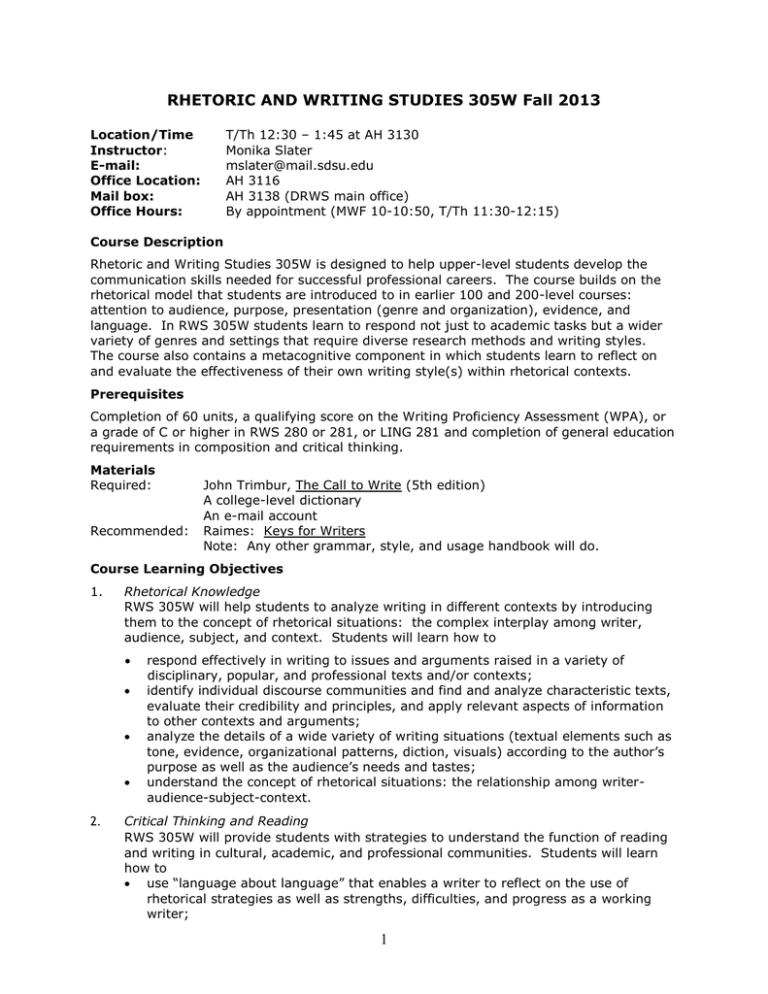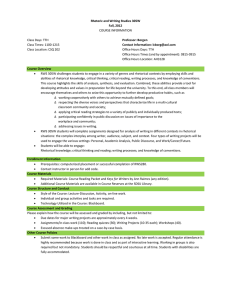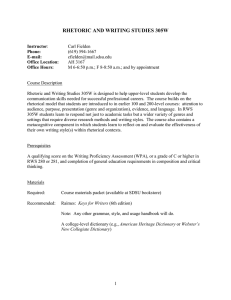RHETORIC AND WRITING STUDIES 305W Fall 2013
advertisement

RHETORIC AND WRITING STUDIES 305W Fall 2013 Location/Time Instructor: E-mail: Office Location: Mail box: Office Hours: T/Th 12:30 – 1:45 at AH 3130 Monika Slater mslater@mail.sdsu.edu AH 3116 AH 3138 (DRWS main office) By appointment (MWF 10-10:50, T/Th 11:30-12:15) Course Description Rhetoric and Writing Studies 305W is designed to help upper-level students develop the communication skills needed for successful professional careers. The course builds on the rhetorical model that students are introduced to in earlier 100 and 200-level courses: attention to audience, purpose, presentation (genre and organization), evidence, and language. In RWS 305W students learn to respond not just to academic tasks but a wider variety of genres and settings that require diverse research methods and writing styles. The course also contains a metacognitive component in which students learn to reflect on and evaluate the effectiveness of their own writing style(s) within rhetorical contexts. Prerequisites Completion of 60 units, a qualifying score on the Writing Proficiency Assessment (WPA), or a grade of C or higher in RWS 280 or 281, or LING 281 and completion of general education requirements in composition and critical thinking. Materials Required: Recommended: John Trimbur, The Call to Write (5th edition) A college-level dictionary An e-mail account Raimes: Keys for Writers Note: Any other grammar, style, and usage handbook will do. Course Learning Objectives 1. Rhetorical Knowledge RWS 305W will help students to analyze writing in different contexts by introducing them to the concept of rhetorical situations: the complex interplay among writer, audience, subject, and context. Students will learn how to 2. respond effectively in writing to issues and arguments raised in a variety of disciplinary, popular, and professional texts and/or contexts; identify individual discourse communities and find and analyze characteristic texts, evaluate their credibility and principles, and apply relevant aspects of information to other contexts and arguments; analyze the details of a wide variety of writing situations (textual elements such as tone, evidence, organizational patterns, diction, visuals) according to the author’s purpose as well as the audience’s needs and tastes; understand the concept of rhetorical situations: the relationship among writeraudience-subject-context. Critical Thinking and Reading RWS 305W will provide students with strategies to understand the function of reading and writing in cultural, academic, and professional communities. Students will learn how to use “language about language” that enables a writer to reflect on the use of rhetorical strategies as well as strengths, difficulties, and progress as a working writer; 1 3. Writing Processes RWS 305W will enhance students’ abilities to develop writing processes that reflect invention, inquiry, revision, and editing. Students will learn how to 4. develop successful, flexible strategies for generating, revising, and editing texts; understand the collaborative and social aspects of the writing process; critique their own and others’ texts. Knowledge of Conventions RWS 305W will provide students with strategies to analyze the writing conventions of different discourse communities and to begin to write effectively within these communities. Students will learn to 5. apply critical reading strategies to a variety of publicly and individually produced texts; work with demanding readings and learn to interpret, incorporate, and evaluate these readings; use writing as a way to learn—to think about, question, and communicate ideas; understand the relationships among language, knowledge and power. understand the ways various discourse communities use different strategies for conveying information, researching information, and evaluating and analyzing information; analyze audience expectations about conventions and address them in critical ways effectively integrate a variety of sources into their writings; practice appropriate means of documenting their sources; sustain reasonable correctness in grammar and mechanics to perform well in a variety of writing contexts and professional settings. Attitudes, Values, and Preparation for Life Beyond the University RWS 305W reflects the values of a liberal arts education, namely, working cooperatively with others to achieve mutually defined goals, face-to-face in the classroom and in other settings; respecting the diverse voices and perspectives that characterize life in a multicultural classroom and society; applying critical reading strategies to a variety of publicly and individually produced texts; valuing free expression and the ability to participate confidently in public discussion on issues of importance to the workplace and the community; showing initiative in problem solving situations. Methods of Evaluating Student Performance Students’ course grades will be based on 1. 2. 3. course assignments (revised in- and out-of-class projects; see the prompts and the course schedule for the types of assignments you will complete and their due dates). If you do revise a paper, the higher of the two grades for a particular assignment will be used in computing your course grade. Except for drafts written in class, all papers must be typed. exercises and quizzes (announced and unannounced). class participation (attendance, in-class assignments, in-class and electronic discussions, peer evaluations, etc). 2 POINTS EACH ASSIGNMENT Prospectus/annotated bibliography Project 1 Project 2 Project 3 Project 4 Reflection Quizzes 60 pts 120 pts 120 pts 120 pts 120 pts 60 pts TOTAL POINTS 600 100 Participation/Attendance 200 Course grades will be based on points earned and assigned according to the following scale: A B C D F Outstanding achievement; available only for the highest accomplishment Praiseworthy achievement; definitely above average Average; awarded for satisfactory performance; the most common undergraduate degree Minimally passing; less than the typical undergraduate achievement Failing % Points GRADE 100 - 95 A 94 - 90 A- 89 - 85 B+ 84 - 79 B 78 - 74 B- 73 - 69 C+ 68 - 63 C 62 - 55 C- Note: As the instructor, I reserve the right to examine and reconsider individual grades in terms of students’ attendance, collaborative effort, and punctuality. Course Policies Participation This is a class in communication, so your participation is essential. Get involved, volunteer, question and probe. Share relevant ideas and observations. Offer your own experiences. It is imperative that you attend class; three or more absences will damage your grade. It is also important that you turn in informal exercises and come to class prepared to discuss the day’s assignments. This is a case of mutual preparedness and respect. In addition, much of the course is collaborative and depends on you to regularly contribute your insights as well as for you to receive feedback. No in-class work can be made up. It is your responsibility to contact a classmate to find out what went on in class. Assignments, due dates, handouts, and other course material is available on the class’s blackboard site. Grades Each document you prepare reflects your knowledge and establishes your professional image. Grades are determined by total points acquired. I will make every effort to quickly evaluate formal written assignments. There is no curve other than the standards generated locally and the standards made explicit and implied through the instructor’s presentations and assignments. Writing Assignment Requirements Specific requirements for assignments will be discussed in class. Assignments are due on the date assigned. As the instructor, I reserve the right to deduct a 3 significant amount of points (10 to 20%) for late work (also see below). All assignments must be prepared with appropriate software and conform to the conventions of the genre. Your papers must be typed and submitted as a hardcopy (no e-mails or memory devices). If you submit revisions, all previous drafts must be attached. Final drafts must show evidence of editing and proofreading. Keep a copy of all assignments you hand in. Maintain a cumulative file that includes all your assignments. The documents in this file will serve as a base for you to judge your improvement during the semester. Late Papers All assignments for this course are to be on time, typed, and stapled. Try to avoid late papers. However, you can receive an extension for good cause if you (1) contact me before the assignment is due by means of a formal memo in which you explain the reason for the delay and (2) propose in the memo a reasonable deadline (less than one week), which you then keep. The memo is a contract. Failure to keep the new deadline breaks the contract, and I will not accept your paper. You can use this option no more than once in a semester. The visual presentation is excluded from this option; it is due on the assigned date. Plagiarism Any writing suspected of plagiarism may result in a failing grade, withdrawal, or in extensive revisions. Plagiarism is a violation of Title 5, California Administrative Code, Part 5, Section 4130(a) and is to be taken seriously. Come See Me for Help You can always make an appointment to see me. You can email me with any question or comment. Please arrange a specific time (to avoid crowds and to ensure that you receive enough individual attention). Also, please make an appointment if you have concerns, questions, or problems with any assignment or any other issue. Classroom Etiquette I am open to ideas here. However, unless we as a class decide otherwise, class participants are encouraged to: Bring books and notes to class. Participate fully in classroom activities: discussions, peer revision and editing, etc. Respect differing opinions, lifestyles, experiences, and worldviews. Respect all speakers, whether the instructor or fellow class participants, by refraining from side conversations, giving the speaker full attention, and treating each other civilly. Come to class on time and stay for entire class. Our class is a community. We work together to build and make that community prosper. So, please do your share in building this community by attending class and being prepared, by arriving in time and bringing your books. Ask for clarification of any confusing points on assignments or lectures. Turn off cell phones and any other electronic devices. Needs The Americans with Disabilities Act requires that reasonable accommodations be provided for students with physical, sensory, cognitive, systemic, learning, and psychiatric disabilities. Please contact the instructor at the beginning of the semester to discuss any such accommodations for this course. This syllabus and schedule are subject to change in the event of extenuating circumstances. If you are absent from class, it is your responsibility to check on announcements made while you were absent. 4


